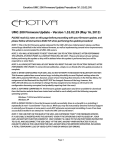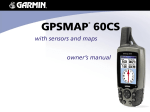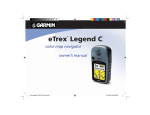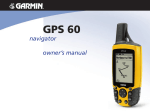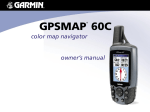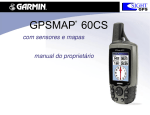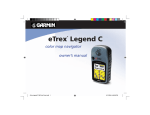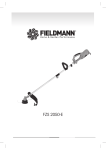Download Garmin Gpsmap 60 Handheld Gps
Transcript
GPSMAP 60 ® map navigator owner’s manual © Copyright 2006 Garmin Ltd. or its subsidiaries Garmin International, Inc. 1200 East 151st Street, Olathe, Kansas 66062, U.S.A. Tel. 913/397.8200 or 800/800.1020 Fax 913/397.8282 Garmin (Europe) Ltd. Unit 5, The Quadrangle, Abbey Park Industrial Estate, Romsey, SO51 9DL, U.K. Tel. 44/0870.8501241 Fax 44/0870.8501251 Garmin Corporation No. 68, Jangshu 2nd Road, Shijr, Taipei County, Taiwan Tel. 886/2.2642.9199 Fax 886/2.2642.9099 All rights reserved. Except as expressly provided herein, no part of this manual may be reproduced, copied, transmitted, disseminated, downloaded or stored in any storage medium, for any purpose without the express prior written consent of Garmin. Garmin hereby grants permission to download a single copy of this manual onto a hard drive or other electronic storage medium to be viewed and to print one copy of this manual or of any revision hereto, provided that such electronic or printed copy of this manual must contain the complete text of this copyright notice and provided further that any unauthorized commercial distribution of this manual or any revision hereto is strictly prohibited. Information in this document is subject to change without notice. Garmin reserves the right to change or improve its products and to make changes in the content without obligation to notify any person or organization of such changes or improvements. Visit the Garmin web site (www.garmin.com) for current updates and supplemental information concerning the use and operation of this and other Garmin products. Garmin®, MapSource®, BlueChart®, TracBack® and GPSMAP® are registered trademarks of Garmin Ltd. or its subsidiaries and may not be used without the express permisison of Garmin. March 2006 Part Number 190-00331-00 Rev. B Printed in Taiwan GPSmap 60 Introduction Preface Thank you for choosing the Garmin GPSmap 60 handheld navigation system. This Owner’s Manual and Reference Guide is comprised of the following sections: Introduction—contains the Garmin software license agreement, FCC and safety information, the Table of Contents and an overview of the GPSmap 60 functional features. Getting Started— takes you through installing batteries, using the unit control buttons, initializing the GPS receiver, etc. GPS Navigation—takes you through the process of navigating with your GPSmap 60 and how to use GPS Navigation to customize the operation of your GPSmap 60. GPS Features—provides detailed descriptions of additional GPS enhanced features such as the Calendar, Hunt and Fish, Sun and Moon and Games, Also included in this section are a few non-GPS features such as the Calculator, a non-GPS enhanced game, etc. Appendices—provides you with additional information about your GPSmap 60 and an index by subject. Preface Contact Garmin If you should encounter any difficulty while using your GPSmap 60, or if you have any questions, in the U.S.A. contact Garmin Product Support by phone at 913-397-8200 or 800-800-1020, Monday – Friday, 8 am – 5 pm Central Time; or by e-mail at [email protected]. In Europe, contact Garmin (Europe) Ltd. at 44/1794.519944. iii GPSmap 60 Introduction Software License Agreement Software License Agreement BY USING THE GPSmap 60, YOU AGREE TO BE BOUND BY THE TERMS AND CONDITIONS OF THE FOLLOWING SOFTWARE LICENSE AGREEMENT. PLEASE READ THIS AGREEMENT CAREFULLY. Garmin grants you a limited license to use the software embedded in this device (the “Software”) in binary executable form in the normal operation of the product. Title, ownership rights and intellectual property rights in and to the Software remain in Garmin. You acknowledge that the Software is the property of Garmin and is protected under the United States of America copyright laws and international copyright treaties. You further acknowledge that the structure, organization and code of the Software are valuable trade secrets of Garmin and that the Software in source code form remains a valuable trade secret of Garmin. You agree not to decompile, disassemble, modify, reverse assemble, reverse engineer or reduce to human readable form the Software or any part thereof or create any derivative works based on the Software. You agree not to export or re-export the Software to any country in violation of the export control laws of the United States of America. iv GPSmap 60 Introduction The GPSmap 60 complies with Part 15 of the FCC interference limits for Class B digital devices FOR HOME OR OFFICE USE. These limits are designed to provide more reasonable protection against harmful interference in a residential installation, and are more stringent than “outdoor” requirements. FCC Compliance Information Operation of this device is subject to the following conditions: (1) This device may not cause harmful interference, and (2) this device must accept any interference received, including interference that may cause undesired operation. This equipment generates, uses and can radiate radio frequency energy and, if not installed and used in accordance with the instructions, may cause harmful interference to radio communications. However, there is no guarantee that interference will not occur in a particular installation. If this equipment does cause harmful interference to radio or television reception, which can be determined by turning the equipment off and on, the user is encouraged to try to correct the interference by one of the following measures: • Reorient or relocate the receiving antenna. • Increase the separation between the equipment and the receiver. • Connect the equipment into an outlet on a circuit different from that to which the receiver is connected. • Consult the dealer or an experienced radio/TV technician for help. The GPSmap 60 does not contain any user-serviceable parts. Repairs should only be made by an authorized Garmin service center. Unauthorized repairs or modifications could result in permanent damage to the equipment, and void your warranty and your authority to operate this device under Part 15 regulations. v GPSmap 60 Introduction Warnings and Precautions CAUTION: Use the GPSmap® 60 at your own risk. To reduce the risk of unsafe operation, carefully review and understand all aspects of this Owner’s Manual—and thoroughly practice operation using the Demo Mode prior to actual use. When in actual use, carefully compare indications from the GPSmap® 60 to all available navigation sources, including the information from other NAVAIDs, visual sightings, charts, etc. For safety, always resolve any discrepancies before continuing navigation. CAUTION: IT IS THE USER’S RESPONSIBILITY TO USE THIS PRODUCT PRUDENTLY. THIS PRODUCT IS INTENDED TO BE USED ONLY AS A NAVIGATIONAL AID AND MUST NOT BE USED FOR ANY PURPOSE REQUIRING PRECISE MEASUREMENT OF DIRECTION, DISTANCE, LOCATION OR TOPOGRAPHY. THIS PRODUCT SHOULD NOT BE USED AS AN AID TO DETERMINE GROUND PROXIMITY FOR AIRCRAFT NAVIGATION. CAUTION: The electronic chart is an aid to navigation and is designed to facilitate the use of authorized government charts, not replace them. Only official government charts and notices to mariners contain all information needed for safe navigation – and, as always, the user is responsible for their prudent use. vi GPSmap 60 Introduction MAP DATA INFORMATION: One of the goals of Garmin is to provide customers with the most complete and accurate cartography that is available to us at a reasonable cost. We use a combination of governmental and private data sources, which we identify as required in product literature and copyright messages displayed to the consumer. Virtually all data sources contain inaccurate or incomplete data to some degree. This is particularly true outside the United States, where complete and accurate digital data is either not available or prohibitively expensive. Warnings and Precautions WARNING: The Global Positioning System (GPS) is operated by the United States government, which is solely responsible for its accuracy and maintenance. The system is subject to changes which could affect the accuracy and performance of all GPS equipment. Although the Garmin GPSmap 60 is a precision electronic NAVigation AID (NAVAID), any NAVAID can be misused or misinterpreted and, therefore, become unsafe. WARNING: This product, its packaging, and its components contain chemicals known to the State of California to cause cancer, birth defects, or reproductive harm. This Notice is being provided in accordance with California’s Proposition 65. If you have any questions or would like additional information, please refer to our web site at http://www.garmin. com/prop65. vii GPSmap 60 Introduction Warnings and Precautions Important Because the Garmin GPSmap 60 can be used for vehicular navigation, important safety considerations must be observed. Please read and observe the instructions on this page. Do Not Mount Where Driver’s Field of Vision is Blocked Do Not Mount in Front of Airbag Panels viii Do Not Place Unsecured on the Vehicle Dash Do Not Mount in Front of an Airbag Field of Deployment Safety Warnings and Cautions—Read This First! WARNING: For use in vehicles, it is the sole responsibility of the owner/operator of a vehicle with the GPSmap 60 installed to place and secure the device so that it will not interfere with the vehicle operating controls and safety devices, obstruct the driver’s view of driving conditions, or cause damage or personal injury in the event of an accident. Do not mount the unit over airbag panels or in the field of airbag deployment. Airbags expand with a rapid force that can propel objects in their path towards the vehicle driver or passengers causing possible injury. Refer to airbag safety precautions contained in the vehicle owner’s manual. Do not mount the unit in a place where the driver or passengers are likely to impact it in a collision. The mounting hardware provided by Garmin is not warranted against collision damage or the consequences thereof. WARNING: When used in vehicles, it is the sole responsibility of the driver of the vehicle to operate the vehicle in a safe manner, maintain full surveillance of all driving conditions at all times, and not become distracted by the unit to the exclusion of safe driving practices. It is unsafe to operate the controls of the unit while you are driving. Failure by the driver of a vehicle equipped with a GPSmap 60 installed to pay full attention to operation of the vehicle and road conditions while the vehicle is in motion could result in an accident with property damage and personal injury. GPSmap 60 Introduction Table of Contents Section 1: Introduction...............................................i-viii Preface.........................................................................................i Software License Agreement........................................................ii FCC Compliance Information....................................................iii Warnings and Precautions......................................................iv-vi Table of Contents................................................................vii-viii Section 2: Getting Started..........................................1-7 Battery Installation and Start Up.................................................1 . Key Functions.............................................................................2 .. Unit Features.............................................................................3 ... Initialization..............................................................................4 ... The Satellite Page.......................................................................4.. Navigating with the GPSmap 60................................................5 . The Main Page Sequence............................................................6 . The Main Page Features............................................................7 Section 3: GPS Navigation.......................................8-56 The Map Page............................................................................8 .. The Compass Page...................................................................14 .. The Trip Computer Page..........................................................16 .. Using Waypoints......................................................................17 .. Using Find...............................................................................21 .. The Main Menu.......................................................................33 Using Tracks......................................................................34 Using Routes......................................................................39 The Highway Page.............................................................44 The Setup Menu................................................................45 System Setup..............................................................45 Interface Setup...........................................................46 Tones Setup...............................................................48 Page Sequence Setup..................................................48 Map Setup.................................................................49 Routing Setup............................................................52 Geocache Setup..........................................................53 Marine Setup..............................................................53 Time Setup.................................................................54 Units Setup.................................................................54 Heading Setup............................................................55 Welcome Page Setup...................................................55 ....... Proximity Waypoints.........................................................56 ix GPSmap 60 Introduction Table of Contents Section 4: GPS Features.........................................57-65 Calendar...................................................................................57 Alarm Clock.............................................................................58 Calculator.................................................................................58 Stopwatch.................................................................................59 Sun and Moon Tables..............................................................60H unt and Fish Tables..............................................................61 .... GPS Enhanced Games............................................................62 . Non-Enhanced Game............................................................65 Section 5: Appendices............................................66-82 Accessories...............................................................................66 . Specifications............................................................................68 Data Field Definitions..............................................................70 Connecting the GPSmap 60 to a Computer.............................74 . Downloading MapSource Map Data........................................75 UTC Offset Chart....................................................................76 . Map Datums and Position Formats..........................................77 . WAAS and DGPS.....................................................................78W iring Diagram ......................................................................79 ..... Index.......................................................................................80... Limited Warranty.........................................................................82 x GPSmap 60 Getting Started Installing the Batteries The GPSmap 60 operates on two “AA” batteries (not included), which are located in the back of the unit. Alkaline or NiMH batteries may be used (see page 45 for setting the battery type.) Stored data will not be lost when batteries are removed. Important Note When replacing batteries, use only new or fully charged batteries. Do not mix Alkaline and NiMH batteries. Rechargeable batteries may typically display less capacity than disposable batteries. To install batteries: 1. Remove the battery cover from the back of the unit by turning the D-Ring 1/4 turn counter-clockwise and pulling out. Remove the batteries from the unit if you don’t plan to use it for several months. Storing batteries in the unit for prolonged periods may result in leakage and damage to the battery compartment. 2. Insert the batteries, observing the proper polarity. A polarity diagram can be found molded into Locking Pin Slot the battery compartment. Follow the manufacturer’s instructions for proper care and disposal of used batteries. Do not incinerate used batteries, as internal materials may ignite with explosive violence. USE BY: 2009 Extensive use of backlighting and/or WAAS as well as key beep tones will significantly reduce battery life. USE BY: 2009 3. Reinstall the battery cover by inserting the bottom slot over the tab at the base of the unit and reinserting the locking pin in the back of the unit. Turn the D-Ring 1/4 turn clockwise to lock in place. Battery Installation and Start Up To set backlighting intensity and timeout, see page 46. To disable WAAS, see page 45. To mute the beep tones, see page 48. Battery Compartment 1 GPSmap 60 Getting Started POWER/BACKLIGHT/CONTRAST Key • Press and hold to turn unit On/Off. • Press and release to display backlighting and contrast controls. Key Functions IN/OUT Zoom Keys • From the Map Page, press to zoom in or out. • From any other page, press to scroll up or down a list. ROCKER Key • Move Up/Down or Right/Left to move through lists, highlight fields, on-screen buttons, icons, enter data or move the map panning arrow. GPSmap 60 PAGE Key • Press to cycle through the main pages. • Press when using the on-screen keyboard to close. FIND Key • Press and release at any time to view the Find Menu Page. • Press and hold for MOB. MARK Key • Press and release at any time to mark your current location as a waypoint. QUIT Key • Press and release to cancel data entry or exit a page. 2 IN OUT FIND PAGE MENU MARK QUIT ENTER MENU Key • Press and release to view options for a page. • Press twice to view the Main Menu. ENTER Key • Press and release to enter highlighted options, data or confirm on-screen messages. Belt Clip/Auxiliary Connector Mount • Clips to a belt for convenient access when hiking or walking. Auxiliary GPS Antenna Connector (under weather cover) GPSmap 60 Getting Started Unit Features GPS Helix Antenna • Provides quick satellite acquisition. • Provides connection to a remote GPS antenna with MCX connector. External Power and Data Connector Port (under weather cover) • Provides interface to a PC for data transfer. • Provides auxiliary AC or DC power adapter connection. USB Connector Port (under weather cover) • Provides interface to a PC for fast data transfer. Battery Compartment Locking D-Ring • Turn 1/4 turn counter-clockwise and lift to remove cover. Battery Compartment Cover Auxiliary Mount Alignment Slots 3 GPSmap 60 Getting Started Initialization & the Satellite Page The GPSmap 60 locates satellites above its position Starting Up the GPS Receiver When you turn on the GPSmap 60, the GPS receiver begins to search for satellites in order to determine (fix) its location. This process is called “initialization” and can take up to 15 minutes the first time you use your unit. Thereafter, if you haven’t moved more than 600 miles from your original location, it takes only seconds to minutes. In order to receive satellite signals, you must be outdoors and have a clear view of the sky. Satellite signals cannot pass through solid materials (except glass) or dense overhead tree cover. To shorten the time required for this first initialization, select “New Location” from the options menu, then you can use the Map Page to determine your general location so the GPSmap 60 can search for just those satellites above your position. To initialize your GPSmap 60: 1. Press and release the POWER key to turn on the unit. GPS Status/ Current Location Field Position of overhead satellites 2. Observe the “Power On” Page followed by the Satellite Page. Options Menu Received satellite signal strength Satellite Page Displaying Satellite Signals 4 3. While the GPS receiver is searching for the satellite signals, a “Locating Satellites” message followed by an “Acquiring Satellites”appears until enough satellites signals are acquired to fix its location. You will also see a sky view array of the satellites overhead with your position centered in the array. The outer circle represents the horizon and the inner circle a position 45o from the horizon. The numbers displayed indicate the number assigned to each satellite. A bar graph displays the strength of signals from each satellite. GPSmap 60 Getting Started 4. When the receiver has signals from at least three satellites, the display at the top of the page will change to indicate position accuracy and location coordinates. The Status Bar at the top of the display indicates the GPS status and status of other features. If, for any reason, you have difficulty initializing your GPSmap 60, the solution could be as simple as moving slightly to avoid objects that are blocking or deflecting the satellite signals. 5. Press and release the PAGE key until the Map Page is displayed. You are now ready to begin GPS-aided navigation. Initialization & The Satellite Page Map Item Details Position Arrow Map Scale Map Pointer Active Navigation is supported by three of the Main Pages: The Map Page graphically shows you, your current location, marks your route to a destination with a route line, and leaves a trail (track log) of where you’ve been. The Compass Page indicates direction to go and direction of travel. The Trip Computer Page records and displays travel data. There are three methods of navigating to a destination when using the GPSmap 60, each graphically displayed on the Map Page. Go To - A direct path to a selected destination (waypoint, city, address, etc.). Track - A previous path of travel that has been stored (logged) in the GPSmap 60. A Track allows you to repeat a path or retrace the path. Route - A path to a destination consisting of intermediate stops along the way (waypoints, cities, exits, points of interest, intersections, etc.). Refer to the sections on Tracks, Routes and Waypoints for details. Map Page with Current Position Arrow Navigating with the GPSmap 60 A Go To A Track A Route 5 GPSmap 60 Getting Started The Main Page Sequence Whenr you turn on the GPSmap 60, you can see the Power On Page, followed by the Satellite Page, which is the first of the Main Pages in sequence. To view each Main Page: 1. Press and release the PAGE key repeatedly to cycle through the main pages. 2. With a page displayed, press the MENU key to display the list of options for that page. Satellite Page Satellite Page Options 6 Trip Computer Page Trip Computer Page Options Map Page Options Map Page Compass Page “Power On” Page Main Menu There are no Options at the Menu level Compass Page Options GPSmap 60 Getting Started Status Bar, Backlighting, Contrast and On-Screen Messages At the top of each page, a Status Bar (which is always displayed) provides current status information for several unit features. • Power to the unit is provided either by batteries or by an auxiliary source (AC or DC Adapter). The Battery Power icon displays the remaining power as the battery becomes depleted. • Satellite signal status is shown when searching for (acquiring) satellites, when a two-dimensional fix is attained and when four or more satellites have been received (three dimensional fix). • Backlighting is Off when you power up the unit. When On, it uses a significant amount of battery power. This icon displays when the backlight is functioning. • The Alarm Clock icon displays whenever the Alarm is set. • The USB cable connection icon, displays when the unit is in communication with a PC Universal Serial Bus. You may want to adjust the backlight level by pressing down on the POWER key and releasing. Then tap the POWER key or ROCKER key Up/Down arrows to cycle through the levels of backlight adjustment. To adjust the screen contrast to improve readability for diffentent lighting conditions, use the ROCKER key Left/Right arrows to move the contrast slider. Whenever a significant event in the operation of the unit occurs, an onscreen message appears to advise you of the occurrence. In each case, the condition is described and often a remedy provided. Pressing the ENTER key will acknowledge and close the message window. The Main Page Features Status Bar Battery Power Acquiring Satellites 2-Dimension Navigation Auxiliary Power Backlight is On Alarm is Set USB is Connected 3-Dimension Navigation Backlight and Contrast Adjustment Sliders (Brightnesses varies according to battery power level.) On-Screen Messages 7 GPSmap 60 GPS Navigation The Map Page “North Up” Mode with Map oriented with North at the top The Map Page Position Arrow The Map Scale Data Fields “Track Up” Mode North Orientation Arrow Guidance Text Street Level Detailed Mapping The Map Page with Data Fields and Guidance Text 8 Using the Map Page The Map Page is the primary navigation feature of the GPSmap 60. The Map Page displays a detailed map of the area surrounding your current location. It allows you to pan the map with the ROCKER key and view your progress when navigating. When in the “Track Up” mode (oriented in the direction of travel), a north reference arrow appears at the top left corner to orient the map. When in the “North Up” mode the map is oriented like a paper map. When you activate the Track Log feature, your path of movement is indicated by a dotted line. The map display can be changed to “Night” mode for easier viewing in dim light. The factory set default automatically changes the display at sunrise and sunset. The map also displays geographic details such as rivers, lakes, highways and towns. The maps to the left show a higher level of detail than the basemap provided with the unit (i.e. residential streets, parks, etc.) because Garmin MapSource® detailed mapping data has been downloaded from a CD-ROM program. You can use the Map Page to do the following: • Determine your current location and progress while moving. • Select and save a map point as a waypoint. • Locate and navigate to map items by following a Route displayed on the map. • Customize the map display to your requirements. GPSmap 60 GPS Navigation Using Map Page Features Use the Zoom IN and OUT buttons to change the map scale. You can show more map area with less detail or less map area with more detail. Press and hold to Zoom the map scale rapidly. The map scale in the lower left hand side of the display is shown in units of measurement selected in the “Units” field of the Unit Setup Page. If you zoom in so far that the resolution of the map data is exceeded and the appearance of the map is no longer accurate, the word, “overzoom” displays just below the map scale. When using MapSource detailed maps, “mapsource” appears below the scale. In many instances the map displays an “Accuracy Circle” surrounding the “Position Icon.” The GPSmap 60 uses both map resolution and GPS accuracy in defining your location to a point within the circle. The smaller the circle, the more accurate your location. When using the “Pan Map” feature, a small outline arrow (Panning Arrow) can be moved about the page to highlight and identify map items or to scroll the map to view areas not shown on the display screen. If there is more than one map item under the Panning Arrow. A list of those items displays with the item highlighted on the map and on the list. Optional data fields can be added at the top of the display to provide a variety of travel and navigational information, see pages that follow. The Map Page Zoom In Zoom Out Map Features Map Scales Panning Arrow Accuracy Circle When navigating, Guidance Text will be displayed at the top of the map. Guidance Text 9 GPSmap 60 GPS Navigation The Map Page The Map Page Options Menu A Quick Look at the Map Page Options 10 Stop Navigation - Stops navigation and is disabled when there is no active navigation. Recalculate - Recalculates a route and is disabled when there is no active navigation. Data Fields - Allows two to four fields to display at the top of the page showing Speed, Heading, Elevation and Time. Guidance Text - Displays messages on the screen to advise you of your next navigation move when navigating to a destination. Change Data Fields - Allows you change data field types. Setup Map - Access to six pages of Map display settings so you can customize the map to your preferences. Measure Distance - Measures the distance from your current location to the Map Pointer. Turn Declutter On - Eliminates the display of items on the map that can block out road details when the map is zoomed out. Restore Defaults - Returns the map display to the factory set map display defaults. The Map Page Options Menu The Map Page can be changed to display a variety of information for navigation. You can stop navigation to a destination and arrange up to four data fields to display the type of navigation information you desire. Include a navigation guidance text message on the map page. You can select the type of data fields to display and change the way the map displays items by selecting your own settings for text size, what items are displayed and more. You can display the distance from your current location to other locations on the map and reduce the amount of map clutter (map item icons and names) to increase the visibility of roads and other geographic features. You can restore the Map Page display to the factory default settings. To arrange the Map Page: 1. With unit turned On, press and release the QUIT key until the Map Page displays. 2. Press the MENU key to display the Map Page Options Menu. 3. Use the ROCKER key to select the feature you want to use to customize the Map Page and press the ENTER key. Some of these options contain sub-menus that allow you to further control how the option is used. The pages that follow discuss each option in detail. GPSmap 60 GPS Navigation To display Data Fields: 1. With the Map Page Options Menu displayed, use the ROCKER key to highlight the Data Fields option and press ENTER. 2. Observe the sub-menu options: “Map Only,” “2 Data Fields,” “3 Data Fields” and “4 Data Fields.” You can choose to leave the Map Page as is (full page map), or add two, three or four navigation data fields. 3. Highlight your choice and press ENTER. To change Data Fields: 1. After you display the data fields, a “Change Data Fields” option appears on the options menu when you press the MENU key. 2. Select this option and press ENTER. 3. Press ENTER again to select from a list of types of navigation data to display in the first data field. 4. After making your selection and entry, use the ROCKER key to move to the next field and repeat the process. Some Data Field Options are related to the display of data received from other devices interfaced to the GPSmap 60. For an explanation of what each option represents, see page 70 of the Appen- The Map Page Data Field Sub-Menu Two Data Fields Three Data Fields List of Data Field Options Four Data Fields 11 GPSmap 60 GPS Navigation The Map Page Guidance Text Options Menu GPS Status Message when not navigating To display Guidance Text: 1. With Map Page displayed, press the MENU key to display the Map Page Options Menu. 2. Highlight the Guidance Text Option and press ENTER to display the Guidance Text Options Menu. 3. Select the desired option “Always Show,” “Never Show” or “Show When Navigating” then press ENTER to activate. If you select “Always Show,” a guidance message will always be displayed whether or not you are navigating. If you select “Show When Navigating,” a guidance message will be displayed until you select “Stop Navigation” from the Options Menu. Guidance Text shows you useful information when using one of the navigation methods described on page 5. If you select “Always Show” and you are not navigating, the message field will display GPS Status information, To set up the Map: Refer to the “Map Setup” section on page 49. 12 Guidance Message when navigating GPSmap 60 GPS Navigation Measuring Distance This Map Page option allows you to determine the distance to a point on the map from your current location. Access the Map Page Options Menu, select “Measure Distance” and press ENTER to activate. To measure between two selected points on the Map, move the Map Pointer to the first map point you want to measure from, press ENTER and then move the Map Pointer to the second map point. Press QUIT to cancel. The Map Page Measured Distance Turning Declutter On/Off This Map Page option allows you to remove map item titles and icons that clutter the view of roadways, especially when the map is zoomed in. To turn Declutter On, access the Map Page Options Menu, select “Declutter On” and press ENTER to activate. Do the same to cancel the “Declutter” option. The “Measure Distance” Option Enabled Restoring Default Settings This option allows you to return the map settings to factory settings. Map Declutter “Off” Map Declutter “On” 13 GPSmap 60 GPS Navigation The Compass Page The Compass Ring moves to indicate North orientation when you are moving. Compass Page Course Pointer Bearing Pointer 14 The Course Pointer indicates your course of travel and the distance you drift off course. The Bearing Pointer always indicates the direction to your destination. Using the Compass Page The Compass Page is your guide to accurate and efficient navigation. It uses traditional navigation displays to provide navigation information. When navigation is in progress, the Compass Page provides navigation data and directions. It uses a graphic compass display, a bearing pointer and digital data fields to display information such as current speed, distance to the next point on the route, estimated arrival time, etc. You can choose from three or four data fields and select the type of data displayed in each from a list of options. When moving, the rotating graphic compass indicates the direction you are heading. The Bearing Pointer indicates the direction (bearing) to your destination relative to your current heading direction. The compass dial and Bearing Pointer work independently to show your direction of movement and the direction to your destination. You can choose between a Bearing Pointer or a Course Pointer for guidance. The compass does not function as a magnetic compass when you are stationary. However when you move, the dial rotates to keep you oriented in relation to North. This is especially helpful when using a paper map in conjunction with your unit for navigation. GPSmap 60 GPS Navigation To use the Compass Page Options: 1. Press the MENU key to display the Options Menu. The Compass Page 2. The first option is “Stop Navigation” which can be highlighted and activated by pressing ENTER to stop navigating. 3. The second option is “Course Pointer” or “Bearing Pointer.” The Bearing Pointer and Compass Ring work independently of the direction of your movement and the direction to your destination. The Bearing Pointer always points directly to the destination, no matter what your current location might be. For example: if the arrow is pointing straight up, you are going directly to your destination. If it points any direction other than up, turn towards that direction until the arrow is pointing up and then continue in that direction. If you are using the “Course Pointer” option instead and you drift away from the line of travel to your destination, the Course Deviation Indicator (CDI) provides graphic indication of drift (right or left) and displays the distance off course. Compass Page Options Menu Course Deviation Distance Course Deviation Indicator (CDI) 4. The third option is “Data Fields.” Highlight the data fields option and press ENTER to display the Show “3 Data Fields” or “4 Data Fields” options. Highlight your selection and press ENTER. Course Pointer Option 5. The next option is “Change Data Fields” which allows you to determine what data is displayed in the fields. When you select this option, the topic of the first data field on the page will be highlighted. When you press ENTER, a list of data options will appear. Refer to page 11 for details on changing data fields. Change Data Fields Option 15 GPSmap 60 GPS Navigation The Trip Computer Page Select “Change Data Fields” or press the ROCKER key to highlight a field you want to change. Options Menu Big Numbers Option 16 Using the Trip Computer Page The Trip Computer Page provides you with a wide variety of travel data that is useful when navigating long distances. It indicates your current speed, average speed, trip odometer and many other statistics useful for navigation. You can customize the Trip Computer display to meet your personal requirements. Selecting the type of data to display is done in the same manner as for the data fields on the Map Page. (See page 11 for details.) If you want to record new data for each trip, a “Reset” option is available. If you want to view significant trip data at a glance, you can use the “Big Numbers” option, which shows fewer fields with larger displays. Before each trip, be certain to reset the trip information by highlighting “Reset” from the options menu and pressing ENTER. The Reset Page offers options for resetting trip computer data, clearing the Track Log and deleting Saved Tracks, Waypoints and Routes. This page allows you select individual items, select all and unselect all. Once your selections are made, highlight the “Apply” button and press ENTER. Answer “OK” to the Yes/Cancel prompt and press ENTER to complete the reset. Selecting the “Restore Defaults” option will return the page to factory settings. Reset Page GPSmap 60 GPS Navigation The Mark Waypoint Page The Mark Waypoint Page allows you to mark and record your current (or any other) location as a waypoint and displays a name for that waypoint and a waypoint symbol. You can mark your current location from any page on the GPSmap 60. To mark your current location as a waypoint: 1. Press in and hold the ENTER key until the Mark Waypoint Page appears. 2. To change the name of the waypoint, use the ROCKER key to highlight the waypoint name field and press ENTER to display the on-screen keypad. Use the ROCKER key and ENTER key to select a name for the waypoint. If you choose a name that has already been used, a “Waypoint Already Exits” message will appear. Press ENTER to acknowledge and choose a new name. Using Waypoints MARK Press the MARK key to display the Mark Waypoint Page Mark Waypoint Page 3. To assign an identifying symbol to a waypoint, use the ROCKER key to highlight the symbol block next to the waypoint name and press ENTER to display the Symbols Chart. 4. To save the waypoint to the Find Menu Waypoints List, highlight “OK” and press ENTER. 5. If you do not want to save it as a new waypoint, press the QUIT key, before pressing any other key, to cancel. Symbols Chart Naming a Waypoint 17 GPSmap 60 GPS Navigation Using Waypoints To create a waypoint with the map panning arrow: 1. With the Map Page displayed, move the panning arrow (map pointer) to the map item you want use as a waypoint. If there is information in the mapping database for that location it will highlight momentarily and display a name or address. 2. Press ENTER to display the information page. With the Waypoint Information Page displayed, highlight the “Save” button at the bottom of the page and then press ENTER to save it to the Find Menu Waypoints List. Map Item selected as a Waypoint If the map selected does not contain any information, a message will appear, stating “No map information at this point. Do you want to create a user waypoint here?”. Select “Yes” and press ENTER to display a new waypoint page. Another method for creating a waypoint is the Man Overboard (MOB) feature. Typically, this is an application for marking a location on water where you cannot stop quickly and must return to a point where there are no land marks for reference. To create a waypoint using the MOB feature: 1. Press and hold the FIND key to display the MOB prompt. 18 Information Page for a Map Point with Data Waypoint Page for a Map Point without Data 2. Select “Yes” and press ENTER to display the Map Page showing the path from your current location to the MOB point. Use the Compass Page for additional guidance to the MOB point. MOB Prompt GPSmap 60 GPS Navigation A waypoint location can be averaged over time for more accuracy, but only while the GPS has a fix on the location and before saving it. Using Waypoints To average a Waypoint Location using measurements over time: 1. With the “New Waypoint” information page displayed, press the MENU key to display the page options menu. 3. Select “Average Location” and press ENTER to display the Average Location Page. It will begin to average automatically. 4. Highlight the “Save” button and press ENTER when desired. Editing a Waypoint A waypoint can be selected from the Find Feature Waypoints list and edited to change the map symbol, name, location coordinates, elevation or to delete it. Refer to page 21 for details on using the Find Feature. Waypoint Symbols Chart Delete Button To edit a Waypoint: 1. Use the Find Feature to display the desired waypoint information page. 2. Make changes as required by highlighting each field and using the waypoint symbol chart and alpha/numeric keypad to enter new data. 3. Press the QUIT key to close and save the changes. Waypoint Options Menu To delete a Waypoint: 1. Use the Find Feature to display the desired waypoint information page. 2. Highlight the “Delete” button at the bottom of the page and press ENTER. Answer “Yes” to the pop-up prompt and press ENTER to delete. Average Location Page 19 GPSmap 60 GPS Navigation To move a Waypoint on the Map Page: Using Waypoints New Location Original Location 1. Use the Find Feature to display the Information Page for the desired waypoint (refer to page 23). 2. Highlight the “Map” button at the bottom of the page and press ENTER to display the waypoint on the map. 3. Press ENTER again to place a “Move” marker next to the waypoint. 4. Use the ROCKER key to drag the waypoint to the desired location on the map and release to place it there. Then press ENTER. Projecting a Waypoint Moving a Waypoint Projecting a waypoint from any map item (another waypoint, etc.) allows you to establish a new waypoint othat is a certain bearing and distance away from that map item. To project a waypoint: 1. Select an item from the Find Menu and display the Information Page. 2. Press the FIND key to display the Options Menu and select “Project Waypoint.” 3. Press ENTER to display the Project Waypoint Page. 20 Project Waypoint Page Projected Waypoint on the Map 4. Enter the distance and bearing to the projected waypoint in the appropriate fields at the bottom of the page and press the MENU key to save and exit. GPSmap 60 GPS Navigation Using the Find Menu The Find Feature provides you with a method for searching for Cities and Exits which are included in the GPSmap 60 basemaps. If you have downloaded Garmin MapSource mapping data that contains additional map detail, you can search for Points of Interest, Addresses and Intersections. If you download BlueChart® data,* you can find detailed Marine items such as Wrecks and Obstructions, NAVAIDS, and Anchorages. If this additional data is not loaded, these options are not available. Waypoints and Geocache Points are items you can create and add to the Find Menu. Searching for a map item is simplified because the map database is separated into groups, which are shown as icons on the Find Menu Page. • When you access a Find group list, by default it will contain only those items near your current location or the Panning Arrow (if active). • To save effort in searching again for an item already found, you can use the “Recent Finds” group, which contains a list of 50 last found items of all categories. The options menu for each map item group offers its own unique search options such as “Find By Name,” “Find Nearest,” “Select Symbol” (for Waypoints), “Change Reference” (by moving the map Panning Arrow to a new location), “Nearest Containing” (a key word you enter) and “Select Category” (for those groups such as Food and Drink, Lodging, etc.). Using these options can effectively shorten your search. * Refer to the Garmin website: http://www.garmin.com//cartography/mapSource/ bluechartCD.jsp Using Find FIND Press the FIND key to display the Find Menu Options Menu for Waypoints Auto Ordering Option places the last selected category at the top of the page. Find Menu Options Menu for groups with Sub-Categories Find By Name Option 21 GPSmap 60 GPS Navigation Using Find Searching for a location using Find By Name If you know the name of the location you want to find, the Find By Name search option may be the easiest method of searching. To find a location using Find By Name: 1. Press the FIND key to display the Find Menu. 2. Use the ROCKER key to highlight the Group icon for the type of item you want to search for and press ENTER to display the page. Or, if you want to search the entire item database, select “All Points of Interest.” 3. Press the MENU key to select “Find By Name.” 4. Use the ROCKER key and ENTER key to operate the keypad at the base of the display and enter the name of the location, when the list displays a match, highlight “OK“ and press ENTER to go a list where you can select the item. 5. Next, the Information Page for that location will display. “Finding” icon displays while searching Searching for a location using Recent Finds The Recent Finds Page saves all of your most recent searches in a list. Your last found location appears at the top of the list. When you exceed the number of entries the list can hold, the oldest is deleted. Pressing the FIND key with Find Menu displayed will take you to this page. To return to a recently found item: Recent Finds List 22 1. With the Find Menu displayed, use the ROCKER key to highlight the Recent Finds icon and press ENTER to display the Recent Finds List. 2. Use the ROCKER key to select the list item you want view and press ENTER to display the Information Page for that item. GPSmap 60 GPS Navigation Using the Find Item Information Page When you select a Find item and press the ENTER key, an Information Page displays with detailed information about the item. This page contains the following information: • A title (if a waypoint, it can be renamed and a map symbol assigned). • An information field (if a waypoint, information you add, if a map item, an address or other description). • Location coordinates, if the item is a waypoint. • Elevation and depth, if a waypoint. • Direction and distance from current location or the map pointer. At the bottom of the page are three on-screen buttons. These buttons will appear differently depending on whether you are selecting a Find item to navigate to or adding a Find item to a route list as a waypoint. • If selecting an item as a destination, the buttons display as follows: Delete - remove from the Waypoints list. Map - display on the Map Page. Go To - start a Go To navigation. • If selecting an item to add to a list of points, these three buttons will be displayed: Save - save as a waypoint. Map - display on the Map Page. Use - insert into a list of points on a route. Using Find Select as a destination Information Page for a Waypoint Select as a Point on a Route Information Page for a Map Item 23 GPSmap 60 GPS Navigation Using Find The Find Information Page Options Menu offers eight options for using a Find Item as a tool for navigation. To use the Find Item Information Page Options Menu: 1. With an Information page displayed for a Find item, press the MENU key to display the Options Menu. 2. Use the ROCKER key to highlight the desired option and press ENTER. The following items appear in the Options Menu: Waypoint Information Page Options include “Average Location” • Average Location - Used when marking waypoints only, it samples a waypoint location over time and averages the result for a more accurate position reference. (Refer to page 19 for detailed information on Location Averaging.) • Project Waypoint - Create a new waypoint by entering a bearing and distance from this point. (Refer to page 20 for detailed instructions.) Find Map Database Item Information Page Options 24 • Find Near Here - Returns you to the Find Menu, where you can search for map items near this point. • Change Reference - Point to a new location on the map Page using the Panning Arrow and press ENTER. • Set Proximity - Program an alarm to sound when you are within a specified radius of an item defined by the Information Page. (Refer to the Section on Proximity Waypoints on page 56 for detailed information.). • Add To Route - Include this item on a New Route or add it to an existing route. (See “Using Routes” page on 39 for details.) GPSmap 60 GPS Navigation Using Find • View Sun and Moon View the Sun and Moon tables for this item location. (Refer to page 60 for detailed information about the Sun and Moon Tables.) • View Hunt and Fish View the Hunt and Fish tables for this item location. (Refer to page 61 for detailed information about the Hunt and Fish Tables.) • Map Information Displays information about the map that the item originated from. (Refer to page 75 of the Appendicies for information about downloading detailed maps.) 25 GPSmap 60 GPS Navigation Searching for a Waypoint The Waypoints List is your storage file for all created and saved waypoints. Waypoints are stored in alpha/numerical order and are also identified by a symbol assigned from a list of symbol types. Waypoints can be selected as destinations and added as points on a route. Using Find Find Waypoint Options Find Waypoints List Waypoint Information Page Waypoint Name and Symbol Enter a notation using the on-screen keypad Waypoint Location Coordinates, Elevation and Depth (if applicable) Remove Waypoint from List 26 Distance and Direction from Current Location View Waypoint on Map Page Navigate to a Waypoint Location To find a Waypoint: 1. Press and hold the FIND key to display the Find Menu. 2. Highlight the Waypoint icon and press ENTER to display the Waypoints List. 3. Use the ROCKER key to scroll up and down the list to find a waypoint. If the list is large, you can press the MENU key to display a list of search options. “Find By Name” allows you to enter the name of the waypoint in a search field. “Find Nearest” allows you to list only those waypoints near your current location. “Select Symbol” allows you to search for only those waypoints of a specific type. “Change Reference” allows you to use the Panning Arrow to select a point on the map other than your current location. 4. Once you find a waypoint, press ENTER to view the Waypoint Information Page. You can edit the data or select “Go To” to navigate to the waypoint. GPSmap 60 GPS Navigation Searching for a Geocache The Find Geocache feature allows you to view the list of geocache locations that you have created using the GPSmap 60 or downloaded from your computer. A geocache location is actually a waypoint with a special geocache symbol assigned to separate it from others on the waypoints list. For more information on creating a geocache point, refer to “Geocache Setup” instructions on page 53. Using Find Options Menu To find a Geocache: 1. Press and hold the FIND key to display the Find Menu. 2. Use the ROCKER key to highlight the Geocache icon and press ENTER to display the Geocache List. You can display either found geocaches or those that have not been found. 3. Use the ROCKER key to highlight the desired geocache in the list and press ENTER to display the information page. 4. Highlight the “Go To” button and press ENTER to navigate to the geocache location. When you navigate to a geocache, the Compass Page changes to “Geocache Navigation” mode and any additional information about downloaded cache location is displayed in the field. Note: When you find a geocache, the unit will mark the cache as found, log an entry into the calendar and provide an option that, when activated, will show the next nearest cache. Find Geocache List Information Page Use Found button when you reach a geocache Use Data button for information about a geocache “Find Next” Option 27 GPSmap 60 GPS Navigation Using Find Find Cities List Searching for a City The Find Cities feature allows you to search for any city listed in the mapping database (either in the basemap or from downloaded detailed mapping data). To find a city: 1. Use the ROCKER key to select the “Cities” option, then press ENTER to display the find by “Nearest” list of cities. Cities Options Menu 2. Use the Options Menu to find a city “By Name,” find by “Nearest Containing,” use “Select Map” to select a different map to search from or “Chance Reference” from your current location using the Map Pointer. Select Maps Options City Information Page 3. If using find “By Name,” begin spelling the name of the city by using the keyboard. When you have entered enough characters to define the name, a match list displays. Scroll through the list to find the city you want. If using “Nearest Containing,” use the keyboard to enter a key word to display a list of cities containing that word. 4. Use the ROCKER key to select the desired city from the list and then press ENTER to display the Information Page for that city. 5. With the Information Page displayed, you can select “Go To,” “Map,” or “Save” options. City Page Options 28 GPSmap 60 GPS Navigation Searching for an Interstate Exit The Find Exits feature allows you to search for the nearest Interstate Exits. 1. Press and hold the FIND key to display the Find Menu. Select the Exits icon, then press ENTER to display the Exit List. 2. Highlight and select an exit type by pressing ENTER. A list of exits nearest to you displays. The title box indicates the interstate highway which is served by the exits. Two fields at the bottom of the page indicate distance and bearing to the exit. 3. Scroll through the list to highlight the desired exit. Press ENTER to display the Information Page for that exit. This page contains the exit description with a list of available services near that exit along with the distance and bearing fields. 4. Use the ROCKER key to move to the list of services and highlight a selection from the list. 5. Press ENTER to display the Information Page for the selected service. The Exit Services Information Page displays the name of the service, its direction from the exit, and a list of the services available. Using Find Find Exits List Exit Information Page Options Menus Exit Services Info Page 29 GPSmap 60 GPS Navigation Using Find Searching for an Address The Find Addresses feature allows you to search for an address if you have downloaded detailed mapping data. Enter the street number, street name and city and the Find Feature will match that data with addresses in the map database. To find an Address: Find Addresses Search Page Find Address Matches 30 Address Information Page 1. Press and hold the FIND key to display the Find Menu. 2. Highlight the Addresses icon and press ENTER to display the “Find Addresses” page. 3. If your unit has a GPS fix, the “Region” field at the top of the page will be completed with your current region and the <Enter Number> field will be highlighted. Identifying a city is not necessary as the database has information for the entire region. 4. Enter the Street Number “<Enter Number>” using the onscreen keypad. Select “OK” to enter the number. 5. Finally press ENTER to display the street list. Use the on-screen keypad to enter enough of the street name to display a match on the list below. For name streets, like Main or Elm, enter the core name instead of “E,” “W,” etc., will make the search faster. 6. When done, a list of matches appears below. Select one and press ENTER to display the Information Page. GPSmap 60 GPS Navigation Searching for an Intersection The Find Intersections feature allows you to search for an intersection if you have downloaded detailed mapping data. Enter the two street names and city and the Find Feature will match that data with intersections in the map database. Using Find To find an Intersection: 1. Press and hold the FIND key to display the Find Menu. 2. Highlight the Intersections icon and press ENTER to display the “Find Intersections” search page. 3. If your unit has a GPS fix, the “Region” field at the top of the page will be completed with your current region and the <Enter Street 1> field will be highlighted. Identifying a city is not necessary, as the database has information for the entire region. 4. With <Enter Street 1> highlighted, follow instructions in step 6 of the previous page. Repeat for <Enter Street 2>. 5. Press ENTER to display the street list. Use the on-screen keypad to enter enough of the street name to display a match on the list below. For name streets, like Main or Elm, enter the core name instead of “E,” “W,” etc., to make the search faster. 6. When done, a list of matches appears below. Select one and press ENTER to display the Information Page. Options Menu Intersections Search Page Intersection Matches Intersection Info Page 31 GPSmap 60 GPS Navigation Searching for a Point of Interest You can use the Find Point of Interest feature to locate a nearby restaurant, lodging, landmark, public building, park, etc. However, you must have downloaded MapSource detailed mapping that supports this feature; otherwise these options, plus Address and Intersection options, are not functional. Using Find To find a point of interest: 1. Press the FIND button to display the Find Menu. 2. Highlight a desired “Points of Interest” icon and then press ENTER to display the list of nearest points. 3. Press the MENU key to choose from search options or choose “Select Category” to narrow your search. 4. Highlight the desired item from the list and then press ENTER to display the Information Page for that item. Find POI Topic List Search Method Select Category If you are searching for a restaurant that is part of a national chain, only the nearest restaurant to your location is displayed when you search using the “Find Nearest” method. If you search using the “By Name” method, then all of the locations for that chain in the mapping database will be displayed, with the closest to your current location listed first. 32 Category List POI Information Page GPSmap 60 GPS Navigation About the Main Menu The Main Menu The Main Menu is the directory for all unit features not in the Main Page sequence. Use the ROCKER key to highlight a feature name and then press ENTER to display the feature page. • Tracks - This feature allows you to maintain a record of your movements (track log) with information. • Routes - Allows you to create a list of points that you wish to navigate to in a specific order and save for later use. • Highway - A useful graphic perspective for navigating a route. • Setup - Controls the settings for many of the unit operating system features. • Proximity - Activates an alarm for a defined radius around a specified waypoint. • Calendar - An outdoor calendar with data access and waypoint association. • Alarm Clock - Allows you to use the GPSmap 60 as an Alarm Clock. • Calculator - A standard or scientific calculator for measurement conversions, etc. • Stopwatch - A multi-featured stopwatch. • Sun & Moon - Sunrise and sunset times, moon phases and sun and moon positions for any given date and time. • Hunt & Fish - A table of time frames for best hunting and fishing opportunities for any given location and date. • Games - A series of challenging games, some incorporating GPS navigation. 33 GPSmap 60 GPS Navigation Using Tracks Using a Track Log The Tracks feature creates an electronic trail on the map page as you travel about and is referred to as a Track Log. A track log contains information about points along its path, including time, position and elevation. Use a Track Log to do the following: • Record your movements for a given time and place and save it. • Measure the area of any space you encompass with a track. • Retrace your path in either direction. To create a Track Log: Tracks Page with Saved Track Log 1. Press and release the QUIT key until the Main Menu displays. Then use the ROCKER key to highlight the Tracks icon. 2. Press ENTER to display the Tracks Page. The page contains On and Off buttons to activate or cancel the Track Log and a Track Log meter which displays the percentage of track log space used. Track Log Options 3. Beneath the Track Log field are four on-screen buttons to “Setup” a track log, “Clear” the track log, “Save” a track log and activate the “TracBack®” feature for the current log. 4. To setup a track log, highlight the “Setup” button and press ENTER to display the Setup page. Check ”Wrap When Full”to continue recording when full by overwriting the oldest data with new. Setup Options 34 Track Log Setup Page GPSmap 60 GPS Navigation 5. Highlight the “Record Method” field and press ENTER to display the Distance, Time and Auto options. Because a track is made of a series of points that define your path of travel, they can be placed a specified “Distance” apart or placed at a “Time” interval you specify. The “Auto” option allows you choose from five intervals. 6. Next, set the interval for setting track points. You can choose from distance, time or frequency values. 7. When completed, press the QUIT key to return to the Track Log Page. Using Tracks To save a Track Log: 1. With the Tracks Page displayed, highlight the “Save” button and press ENTER. You will be asked “Do You Want To Save the Entire Track?”. If you select “Yes,”a “Saving Track” message appears followed by the Saved Track Page. The new saved track will be a representation of the entire track log from beginning to end. 2. If you select “No,” a map showing the entire track appears and prompts “Select the beginning point for the saved track.” Use the ROCKER key to move the Panning Arrow to the point on the track line that you want to become the beginning of the Saved Track and press ENTER. 3. The next prompt asks you, “Select the ending point for the saved track.” Use the Panning Arrow to identify a point on the track that you want as the End Point and press ENTER. A “Saving Track” message appears followed by the Saved Track Page. (cont. on page 36) Saved Track Page Saved Track on Map Select Track Ending Point Select Track Beginning Point 35 GPSmap 60 GPS Navigation Using Tracks 4. The Saved Track Page allows you to rename the track, view the track distance, view the calculated area encompassed by the track (an area is defined even if the track is open ended) and specify a color for the track when displayed on the map page (Show On Map). On-screen buttons at the bottom of the page allow you to Save the track (OK), delete, view it on the Map, and navigate the track back to any point along the track (TracBack). To view a Track on the Map: Saved Track Page Saved Track on the Map Page Area Calculation Option To calculate the area of a Track: Start Calculation Stop Calculation 36 1. With the Saved Tracks Page for the track or the Track Log displayed, highlight the Map button and press ENTER to display the Map Page. 2. A map showing the entire track appears with Begin and End markers. Any User Waypoints added to the Track will be displayed as well. Save Calculated Track 1. With the Track Log Page displayed and the Track Log On, press the MENU key, highlight the Area Calculation option and press ENTER. 2. Press ENTER to start the calculation as you begin to move and define the area’s boundaries. The page now displays a Stop button. 3. When you have completed defining the area, press ENTER to display the page with a Save button. 4. Press ENTER again to save the new track to the Saved Tracks List. GPSmap 60 GPS Navigation Track Profiles A Track Elevation Profile can be created from Digital Elevation Models (DEM) maps (MapSource U.S. Topo 24K) which include elevation data contained in the map. To create a track profile, you must be located within the geographic area supported by the DEM map data loaded on your GPSmap 60. A Track Profile page displays when you select “Profile.” See page 75 for more information about MapSource U.S. Topo 24K maps. Using Tracks View Profile Page Option To view a Track Profile: 1. With the Saved Tracks Page for the Track displayed, press the MENU key to display the Profile option. 2. Then press ENTER to display the Track Profile. The beginning of the track is marked by a flag and you can scroll across the profile by pressing the left ROCKER key arrow. As you scroll the profile, the elevation for each point on the profile is displayed at the top of the page and the distance from the Start point and the End Point is displayed at the bottom. 3. At any point along the profile, you can press ENTER to display that point on the map. 4. Press the MENU key to use “Zoom Ranges” and “Hide Symbols” options. Track Profile Page Zoom Ranges Page 37















































